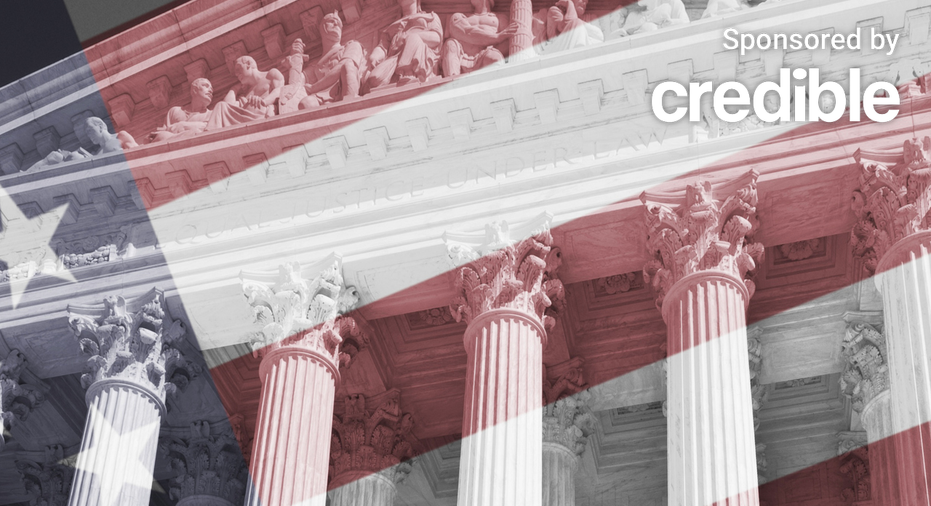Student loan forgiveness: Supreme Court hears cases on Biden’s debt relief plan
President Biden’s student loan forgiveness plan aims to forgive up to $10,000 in federal student loans

About $441 billion in student loan balances are eligible for forgiveness under the plan, according to one report. (iStock)
The Supreme Court will hear two cases against President Joe Biden’s student loan forgiveness plan on Tuesday. The controversial proposal could affect millions of federal student loan borrowers.
The plan aims to forgive up to $10,000 in federal student loans or up to $20,000 for Pell Grant recipients. About $441 billion in student loan balances are eligible for forgiveness under the plan, and it could eliminate balances for almost 40% of federal student loan borrowers, according to a report by the Federal Reserve Bank of New York.
However, the president’s initiative has faced several lawsuits. Two of those will come before the Supreme Court.
In one case, the states of Nebraska, Missouri, Arkansas, Iowa, Kansas and South Carolina have argued the plan is unlawful and would harm their tax revenues. In the other case, two individuals, Myra Brown and Alexander Taylor, have claimed the debt forgiveness plan is unlawful because the administration did not give the public time to weigh in before rolling it out in 2022.
If you hold private student loans, you won’t be eligible for any kind of federal student loan forgiveness. You could consider refinancing your private student loans to get a lower interest rate and reduce your monthly payments. Visit Credible to compare options from different lenders at once, without affecting your credit score.
BIDEN ADMINISTRATION APPROVES MORE THAN 16 MILLION BORROWERS FOR STUDENT LOAN FORGIVENESS
Six states claim Biden’s student loan forgiveness plan is unlawful
The lawsuit filed by the six states – Nebraska, Missouri, Arkansas, Iowa, Kansas and South Carolina – has claimed the plan would affect the states' tax revenues because it would discharge some student loans that would have been discharged in the future.
Federal law doesn’t treat discharges that occur between 2021 and 2025 as taxable income. "The Secretary’s plan would reduce the taxes that the States would otherwise collect from borrowers in those years," read a court brief.
In addition, the lawsuit has claimed the president is using the HEROES Act of 2003 to justify the plan. The Higher Education Relief Opportunities for Students (HEROES) Act of 2003 allows Congress to waive restrictions on student loan relief in the face of a national emergency.
The Biden administration has claimed COVID-19 is such an emergency. In fact, the nation has been under a state of emergency since March 2020 when it was declared by President Donald Trump. The national emergency will end on May 11, 2023, according to the Kaiser Family Foundation.
The White House has remained confident that the HEROES Act justifies his student debt forgiveness plan. In an opening brief, the administration claimed the "Secretary’s actions fall comfortably within the plain text of the Act."
In the other case that SCOTUS will review, plaintiffs Myra Brown and Alexander Taylor have argued the plan is unjust because it either partially or completely hinders them from enjoying the full scope of proposed benefits.
They have also claimed the Department of Education "failed[ed] to follow proper rulemaking procedures" before rolling out the plan and did not give the public enough time to comment on the proposal, according to a court brief.
Should the Supreme Court approve Biden’s student loan forgiveness plan, private student loan borrowers won’t benefit from it. If you have private student loans, you could consider refinancing your loans for a lower interest rate. Visit Credible to get your personalized rate in minutes, without affecting your credit score.
SOCIAL SECURITY BENEFITS CAN BE TAKEN TO PAY STUDENT LOANS IN DEFAULT
Student loan payment pause set to end
Since 2020, federal student loan payments and the interest accumulated have been put on pause in order to provide relief for borrowers during the COVID-19 pandemic. In November, the Biden Administration extended that pause.
However, the president announced that if the student debt forgiveness plan has not been put into effect and the litigation has not been resolved by June 30, 2023, payments will resume 60 days following.
Many Americans have said they would be financially harmed when repayment begins. More than half of federal student loan borrowers said they would not be ready for repayment, according to a study by Morning Consult.
The average borrower holds about $29,000 in student loan debt, according to the report. Among households making less than $50,000 a year, 68% said they would not be able to afford the payments. For those making less than $25,000, 54% said they wouldn’t be able to make those payments.
If you’re having trouble making your private student loan payments, you could consider refinancing to a lower interest rate. Visit Credible to speak with a student loan expert and get your questions answered.
SECURE 2.0 ACT: STUDENT LOAN PAYMENTS WILL COUNT TOWARD 401(K) MATCHING CONTRIBUTIONS
Have a finance-related question, but don't know who to ask? Email The Credible Money Expert at moneyexpert@credible.com and your question might be answered by Credible in our Money Expert column.




















